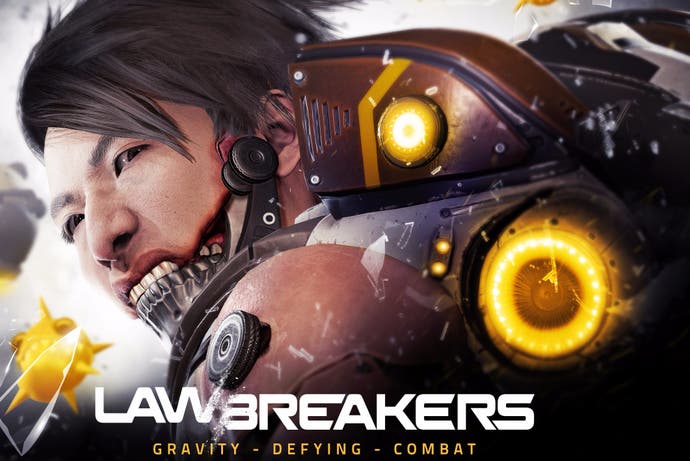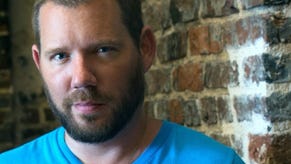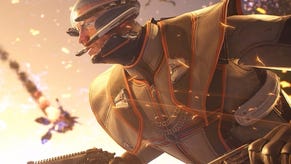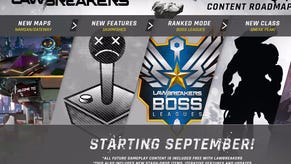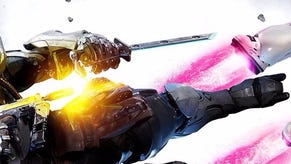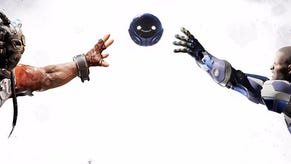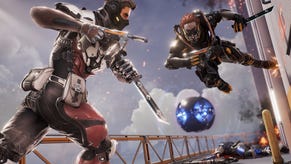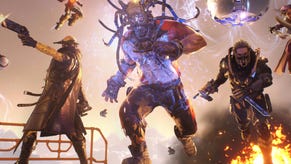The big Cliff Bleszinski interview
'I've had a very polarising personality in the 25 years I've been doing this.'
There's probably never a good time to talk to an exceptionally busy CEO, but I guarantee it's most certainly not this; just days after the launch of the game you've been gearing up to for three years, and the first fruits of your box-fresh studio.

So I'm grateful that Cliff Bleszinski was gracious enough to take the time out to talk to me, just over 24 hours after the launch of his first game in some six years. LawBreakers is, by all accounts, an incredible shooter that successfully harks back to classics such as Unreal Tournament - which Bleszinski worked on as designer, of course - though it's yet to find traction, the number of Steam players around at launch lower than that of Battleborn.
We spoke about its launch, its future and more over an often sketchy Skype line, and over the 30 minute conversation it struck me that - through the swearing and the tangents and the soundbites - no matter where you stand on Bleszinski, it's certainly grand to have him back.
It's been a while since you last shipped a game.
Cliff Bleszinski: My wife's been with me eight years this august - the only game she's been with me when I've shipped was Gears 3. The thing this time was a new business partner with Nexon, a whole new studio, I'm the primary owner and CEO - it's not Tim Sweeney's and Mark Rein's gig anymore. I'm feeling good right now - it's getting a solid response - but beforehand it was like holy crap, heavy is the head that wears the crown. This studio did in fact give me my first grey hairs.
When I was at Epic, Gears 3 came out, the team did Judgement which I didn't work on. Then Epic was like let's do a game jam, and they wound up doing this little project doing Fortnite that I was walking on before Tencent bought all my shares. That's kind of sort of shipped. It took a while to come out - because making games is hard - but what's happened in that time-frame is established triple-a brands are still moving along at a decent clip - your Call of Duties, your Assassin's Creeds - and you see this mid-tier game returning.
There's this kind of thing that's happened that everyone got tired of this post-apocalyptic look that everything rubberbanded back to this bright cartoony look. You have this generation raised on Pixar movies where all the characters have these big expressive eyes - you look at the Fortnite trailer and it looks like Anna and Elsa running around killing the zombies - and I respect that, but it's one of the things with the studio and our sensibilities and tastes, we wanted to make a character-based first person shooter that appeals to the Call of Duty and Halo crowd, that's a little more grounded gritty sci-fi as opposed to the cartoony look of the past few years.
Regarding the launch itself, there was a technical issue with the PS4 version.
Cliff Bleszinski: It's one of those things - my CEO Arjan, he's very big on frame rate and always has been, going back to when we did Jazz Jackrabbit, and a small snafu slipped through the PlayStation version where people would join and leave and a small hitch would hit, which is entirely unacceptable, and the programming team scrambled and worked for 16 hours to make sure that was fixed. We're now at the point where the game's running at a smooth 60fps - and PC, if you've got a solid rig, you can get it up to 144 plus. The older I've got the more of a framerate snob I've become. I can't play a shooter at 30fps - I just can't do it - I need 60 or higher. There's a whole argument about 24fps is more cinematic - for your cutscenes that's fine but for actual gameplay fuck off, right?
At what point did you realise the PS4 thing was an issue?
Cliff Bleszinski: We did a soft rollout on the 7th where we started slowly ramping up servers. A lot of games launch online and the hungry gamers join, there's often not enough servers there - and the game can faceplant. There's a surprisingly hungry audience on PlayStation which is really encouraging to see, considering I was initially envisioning this as a core PC game. We're alert to the issue - in a world where there's any issue with your game you're going to hear about it on Twitter, on Reddit, and I'd rather have people yell at me on my own personal feed rather than not saying anything at all. My senior producer Chris Mielke wrote a book called 'Make the CEO Fix It' where you can guess CEO email addresses and if the CEO's a good CEO they'll chase down whatever the issue is because it means they give a shit.
There's a lot of hands-on I did with things like player movement, making sure the blitz ball actually has a fucking personality, I had to babysit every step of the way that the ball was the right scale, that the face animated, I cast Justin Roiland as the voice... But to be honest, that's the stuff I like. I know it's a bit of a tangent - doing email and being CEO, it's part of the gig, but it's not the fun part. The fun part is rolling up my sleeves and being in the playtest lab with the troops.
So what's changed since when you last shipped a game and now?
Cliff Bleszinski: We see this game as a marathon and not a sprint. We're having a solid opening but we're reminding people that we shipped with nine characters, in the play test lab we're playing with role ten, it's fully playable. I've played two maps that are 99 per cent ready to go, maybe new game types that I can't really talk about. I've seen skins and meshes for characters that are really cool that players won't see for a couple of months. That's the world we live in - it's no longer fire and forget.
What we've found is that Steam is a very harsh platform, and if you go to Steam reviews for any game, you can't bullshit Steam users, PC users. I'm not saying you can bullshit console users, but Steam users are some of the most savvy gamers out there. If you go to our reviews they're 90 per cent positive. We've created a community over the last three years of really loyal and dedicated fans who love the game and the studio.
People do seem to be enjoying it. The problem seems to be there aren't enough people playing it. There were 1500 concurrents when I last looked - that's quite low.
Cliff Bleszinski: It's like I said, it's a marathon not a sprint. I'd rather be the underhyped game that slowly ramps up into something that people adore than something that comes out with way too much hype that there's a backlash for, which is why I think the Steam reviews are so positive. We're going to continue to raise awareness, continue to support the product - if you look at the phenomenon that was League of Legends, it built off a Warcraft 3 mod then slowly but surely blossomed into this immense amazing thing, and I'd rather be the game that comes up and has that hockey stick ramp with a slow burn and builds up rather than the triple-A hype machine where you have a bazillion people playing it month one and it goes down exponentially then they follow up with an annual product.
It seems like a soft launch. Is that by design?
Cliff Bleszinski: It's one of those things - we're not doing the traditional pop of what triple-A is. We're feeling out this new space, much like Hellblade is, for what for lack of a better term is double-A. That flash-in-the-pan pop, to be frank, comes from those traditional publicly based publisher companies that are addicted to their earnings on Wall St, and that works for many of them - for your Activisions and EAs - but we're trying to forge a new model here, which is the tortoise versus the hare.
There was that shift away from free-to-play - did that change the perception in any way?
Cliff Bleszinski: Hindsight is 20/20, and one of my strengths is I'm willing to admit my own weaknesses and when I was wrong, and there's a couple of things I'd have done differently over the last few years. The first thing would have been the alpha - it was okay for what it was, but it wasn't the full vision for what I wanted to achieve with this team. And if I could go back, I wouldn't have allowed that to be publicly streamed because it deflated some of the expectations, and we have to work three times as hard to win people back based on that perception. The other thing was, when we announced it as free-to-play - you can read it on any forum reaction 'sweet, Cliff's back', but then it's 'free-to-play? Nexon?'. The Nexon thing people can get over - a publisher who has traditionally done certain practices, and people are going to assume they're going to do the same thing until they do something different. It's the whole thing like 'oh a first person shooter won't work on consoles', and then everyone does it.
The thing with free-to-play - there are good free-to-play games like League and things like that - but when it comes to first-person shooters, first-person shooter players are very cynical with regards to that. They expect gun rentals, they expect to be nickel and dimmed, and they're used to microtransactions in $60 games. So we thought what about a mid-tier price point? We found looking at the backward stats in regard to the initial flush of people, a lot of players really appreciate $29.99 entry point. They're happy to throw $30 or $40 at our cosmetic crates to see what's in the box. It's one of those things - if you try and be a good guy studio often people respond really well.
You've got a big name in the industry and it carries with it certain perceptions. Do you think that might have harmed Lawbreakers as much as it helped it?
Cliff Bleszinski: Yeah, that's possible. I've had a very polarising personality through the majority of the frickin' 25 years I've been doing this. It probably comes from a lack of being popular in school or something - I don't really know. But what I do and bring to the table brings a certain amount of weight. You also have an entire generation of 15-year-old kids who don't know who I am, nor do they give a shit - they're more excited about their favourite Twitch streamer or YouTuber, which we've recognised in regards to appealing to that crowd, and building relationships with them, occasionally finding the ones that aren't fans of us and throwing a bit of money at them to see if they want to give it a go to kind of help raise awareness and get the word out. This business moves fast, and you're only as good as your last game - even in the 18 months that I took off when I retired after busting my butt for many years making games, I found that even with the team of veterans that I brought to the table, you still have to prove yourself from scratch every time. Which is why I now have my first grey hairs.
You've got those first grey hairs, but has your approach mellowed in old age?
Cliff Bleszinski: Well, the older I get, the more I hate my time being wasted. And my partner Arjan, he's a programmer and he's ruthlessly efficient, he hates having his time wasted. In North Carolina you have to get your car inspected once a year because of some state bullshit - I want to either be enjoying time with my wife or friends and family and everything else can fuck off.
I don't want to be one of these people that you tell to fuck off because I'm keeping you from making games, but before I go can we quickly rewind a short while - why did you choose to leave Epic?
Cliff Bleszinski: I've been pretty frank with it - I'd worked hard for them for many years, but Tencent came along and wanted to buy a lot of our stocks, so I was like okay and I received a pretty ample windfall at that point. And there's no real golden parachute or strings attached. I was at the point getting very burnt out creatively, freshly married and happy as hell and I just thought I just want to fade out into the sunset for a while. It's really that simple. I'm still friendly with my friends over there. They've grown into a company that has some cool games like Fortnite and Paragon and they're really doubling down on the enterprise software part of the business - they always wanted Unreal used in film and TV - but I look fondly back on my time back there. I wish them well - I just needed to do this studio in my time any my way.
What was retirement like when you're in your relative youth with a pretty big windfall?
Cliff Bleszinski: I used to live in an apartment then decided I wanted to live in a house. I was happily married and eventually moved into this house and I was thoroughly enjoying it, until - they saying I like to use is, my wife and I used to be sitting at dinner and it was the classic 'how was your day', and we would be like you were there the whole day. It's like Chris Rock used to say, go get kidnapped, have some new shit happen to you. I remember starting the studio three years ago and taking my book bag and my laptop and it felt like the first day at school. It was the first time I'd been up before noon in like a year. It's been really good for my professional and personal life to create this studio.
Just finally - what are your aspirations for Lawbreakers, and how are you going to get it there?
Cliff Bleszinski: I see it that we made the kind of game we want to play, something that appeals to core shooter players such as Counter-Strike Go players that doesn't have kiddy bumpers on it in regards to freezing the player, making the player go to sleep - these are things that have appeared in first-person shooters lately that I do not enjoy. We're going to continue to grow the game, continue to grow awareness and continue to support it. We're in this for the long haul.
